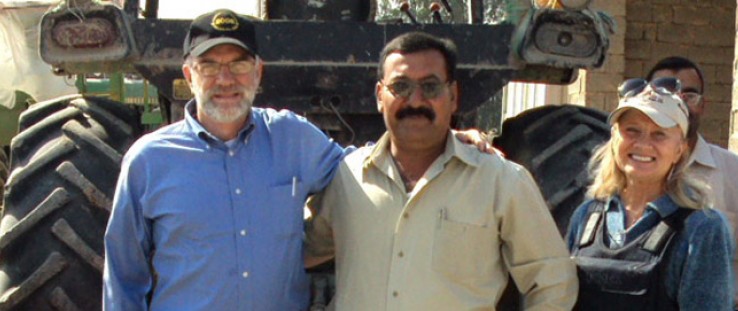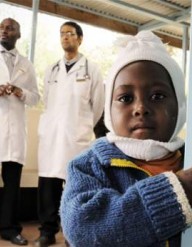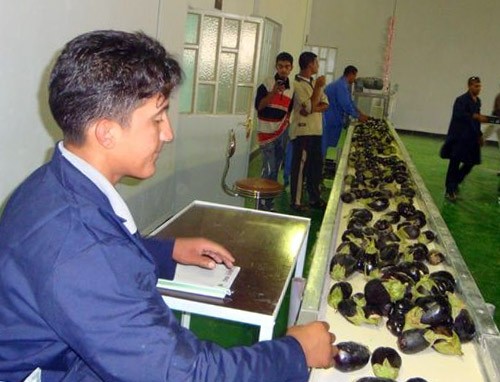 Michael Maxey, senior economic development adviser in USAID's Iraq Reconstruction Office, left, visits a project site for the Inma Agribusiness Program, posing with a local agribusiness owner.
Michael Maxey, USAID
Michael Maxey, senior economic development adviser in USAID's Iraq Reconstruction Office, left, visits a project site for the Inma Agribusiness Program, posing with a local agribusiness owner.
Michael Maxey, USAID
 Michael Maxey, senior economic development adviser in USAID's Iraq Reconstruction Office, left, visits a project site for the Inma Agribusiness Program, posing with a local agribusiness owner.
Michael Maxey, USAID
Michael Maxey, senior economic development adviser in USAID's Iraq Reconstruction Office, left, visits a project site for the Inma Agribusiness Program, posing with a local agribusiness owner.
Michael Maxey, USAID
In a land where summer temperatures often exceed 120 degrees Fahrenheit, perishable goods such as fruits and vegetables with their easy-to-bruise exteriors and soft interiors spoil quickly. Typically, half of Iraqi harvests never make it to market at all due to poor handling.
But USAID's Inma Agricultural Program is changing that with the opening of five packing houses in Baghdad, Anbar, Karbala, Radwaniya, and Fallujah. “Inma” means “growth” in Arabic.
The packing houses are teaching farmers new ways to handle and package produce so it stays fresh longer and reaches markets in better condition. Ultimately, this means better quality and quantity of produce for consumers and more income for farmers. USAID provided grants totaling $2.4 million to existing packing houses for refurbishment, training, and technical assistance to work with farmers and consolidators. The farmers use the packing houses as a central sales point for the produce they are marketing.
This is just one of several USAID-Inma projects helping Iraqis to become increasingly self-sufficient in food production. USAID has created a large fish farming industry. Today there are 1,800 fish farms raising carp; in 2008 there were none. USAID has mechanized alfalfa production, helping Iraq make a 20-year leap in technology. It has introduced feedlots for raising livestock, which are more efficient than traditional grazing, and produce fatter animals in shorter periods of time. The Agency has also established demonstration strawberry plots, proving that growing this typically imported delicacy can be profitable for local farmers.
From Ground to Market
But getting fresh produce to market is one of USAID-Inma's primary goals.
The Sheikh Sabah Packing Facility in Taji, Baghdad, has been in operation since August 2009. Workers use modern technology, equipment, and methodologies to receive, clean, sort, grade, temporarily store, and package an average of 30 tons of fruits and vegetables daily.
Sheikh Sabah Sarhan Dhari Al Zobaee, who owns and operates the packing house and comes from a long line of farmers going back to his great-grandfather, uses the facility to pack tomatoes, cucumbers, and eggplant from April to June; stone fruit from June to early August; peppers during May and June; and citrus fruits and grapes from July to December.
“USAID established a successful agriculture investment in the Taji area and brought new methods of marketing,” said Al Zobaee. “This area suffered from ignorance in the agricultural sector, plus lack of experience and resources. USAID-Inma presented me with a very good opportunity to improve my business, and the packing house created 15 jobs for unemployed members of farmers' families.”
By adopting modern post-harvest handling techniques, local growers like Al Zobaee are helping to address the lack of homegrown quality fruits and vegetables. Despite its agricultural resources, Iraq must import a considerable amount of its food due to the deterioration of the agribusiness sector under the previous regime. The new techniques also allow local farmers to produce an affordable, attractive product that can compete with more expensive imports.
“The packing shed encourages Iraqi consumers to buy Iraqi produce due to the way it is cleanly packed and labels on the products that tell the production and expiration date,” said Al Zobaee.
To date, the packing houses have been able to increase their gross sales of fruits and vegetables by $8.7 million, creating 253 jobs in the process with USAID support.
With the improvements brought by the packing sheds, farmers are even beginning to explore selling their more lucrative crops overseas. “Now USAID-Inma is helping us export our products outside of Iraq, especially dates, to be sold in the U.K. market,” said Al Zobaee.










Comment
Make a general inquiry or suggest an improvement.